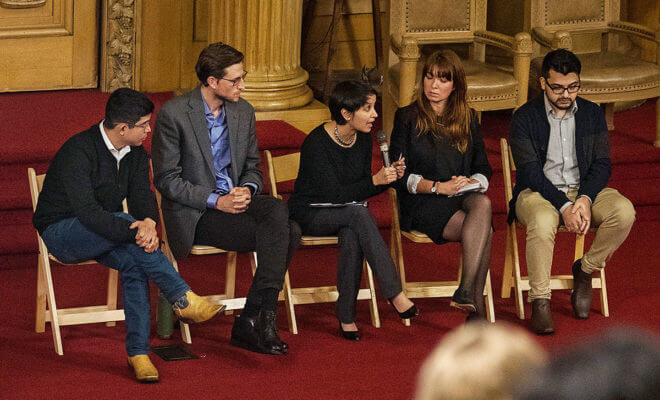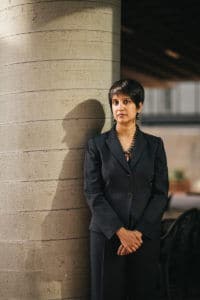Health
‘It’s My Life’: Brain Cancer Motivates City Commissioner’s Activism

Nisha Agarwal, center, speaks while participating on a panel discussion about protecting undocumented immigrants and New York’s sanctuary city policies, in New York. Agarwal is battling brain cancer at a critical time for New York officials seeking to defend the rights of undocumented immigrants against the Trump administration’s stepped-up enforcement.
Photo: Demetrius Freeman/The New York Times
“It’s no surprise to me that in a moment of immense personal struggle and pain, Nisha is using her voice to speak out for others,” New York Mayor Bill de Blasio said.
As commissioner of the Mayor’s Office of Immigrant Affairs, Nisha Agarwal would often lobby legislators on behalf of vulnerable New Yorkers. On Monday she was lobbying again — but for herself.
Agarwal, 39, who has been on medical leave from City Hall since August, revealed in an interview Monday that she has a rare form of brain cancer. During surgery to remove the tumor, she said, she suffered a stroke, which initially left her unable to speak or walk.
She has been rehabilitating ever since, and made it to Washington to protest the Republican tax bill in a furious last gasp before voting began.
Agarwal said she has a form of brain cancer known as glioma, which is different from the glioblastoma that Sen. John McCain, R-Ariz., is battling. Agarwal’s cancer has no cure yet, and she worried that the tax plan would cause cuts in medical funding that could slow the work of researchers looking for one.
She said fiercely, “It’s my life.”

Nisha Agarwal, immigration commissioner for New York City, who has been fighting a rare form of brain cancer, a diagnosis that has propelled her to protest potential cuts in medical funding, in New York. Agarwal’s cancer has no cure yet, and she worries that the Republican tax plan would cause cuts in medical funding that could slow the work of researchers looking for one. Photo: Lexey Swall/The New York Times
Agarwal has not said much to colleagues about her illness, which was first diagnosed in May 2016. Mayor Bill de Blasio appointed her in February 2014, and she is one of his longest-tenured commissioners. The immigrant affairs office had fewer than a dozen employees when she started and now works with hundreds of people.
Bitta Mostofi has been the department’s acting commissioner since August, and Agarwal has not officially resigned. She said that the city had promised her a job when she could return, and that she was grateful to have such stability. “But what about for people who don’t, in other jobs like construction or security?” Agarwal asked.
“It’s no surprise to me that in a moment of immense personal struggle and pain, Nisha is using her voice to speak out for others,” de Blasio said Monday night.
Her illness comes at a critical time for New York officials seeking to defend the rights of unauthorized immigrants against the Trump administration’s stepped-up enforcement. In early 2017, she testified in state Supreme Court on Staten Island for the city’s right to destroy the personal information of unauthorized immigrants collected for the municipal ID card program known as IDNYC.
In June, during intense City Council hearings, she pushed the mayor’s agenda to use a public-private model to fund legal services for unauthorized immigrants, with the city paying for lawyers for those who had not been convicted of serious crimes.
“She was holding the line for the mayor while everyone just attacked,” said Councilman Carlos Menchaca, the chairman of the immigration committee. “But she told me, ‘At all times, we have to keep ourselves in a place where we can respect each other.’ ”
Menchaca was shocked when told of her cancer on Monday morning, saying she had said little to him about her illness.
Six months after her stroke, Agarwal still hesitates slightly when speaking and uses a cane to walk, but her spirited laugh is intact. She went to the offices of a half-dozen members of Congress on Monday, lobbying with activists from the Center for Popular Democracy, a nonprofit that works with community groups, and where she was once deputy director.
At the Capitol, she did not go into details about her personal story; that she left to her friend and former colleague Ady Barkan, who has amyotrophic lateral sclerosis, known as ALS or Lou Gehrig’s disease.
Agarwal was Barkan’s boss at the Center. He has gained notoriety for confronting Republican lawmakers in his wheelchair, but was eager to deflect the attention to speak about his mentor.
“She’s a fighter, so powerful,” said Barkan, 34.
A child of immigrants from India, Agarwal became a public interest lawyer out of Harvard Law School, leading the Health Justice Program at the New York Lawyers for the Public Interest in 2006. Among other initiatives, she worked for translation services for immigrants seeking health care. She later was the executive director of the Immigrant Justice Corps, a legal fellowship begun by Robert A. Katzmann, the chief judge of the U.S. Court of Appeals for the 2nd Circuit.
Next Wednesday, on her 40th birthday, Agarwal will start 6 1/2 weeks of radiation treatment for a particular type of brain cancer she called “IDH.”
Dr. Andrew S. Chi, a director of the Brain Tumor Center at New York University’s Perlmutter Cancer Center, said that type of cancer is defined by a gene mutation in the tumor and mostly affects younger people in their 20s and 30s.
“They are slower growing than the traditional glioblastomas, so patients live longer, but their life span generally isn’t as long as should be,” Chi said. An estimated 3,000 to 5,000 adults receive a diagnosis of this rare form of cancer each year, he said.
Agarwal said her doctors had told her the prognosis was not good.
“What they’ve said to me — and maybe this is what brought me to D.C. — ‘You have six to eight years facing this,’” Agarwal said, adding that researchers told her, “We have so much stuff that’s underway for what you have that we can fix it in a year or two years or three.”
“That is what’s so scary,” she said. “If they can’t go as fast as they hoped, it will be because of this tax plan.”
© New York Times

You must be logged in to post a comment Login